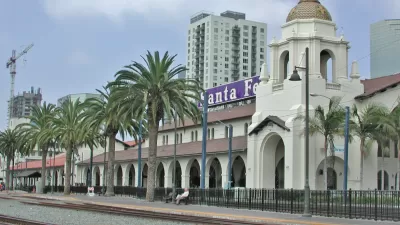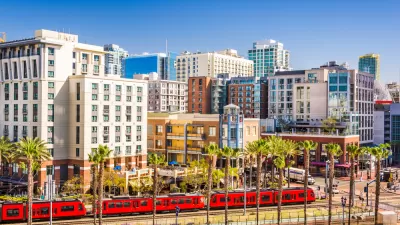Many cities and counties across the state are proposing transportation sales tax increases, but only San Diego's is opposed by a diverse coalition of environmental and labor groups. Murtaza Baxamusa explains why.

San Diego's Regional Transportation Planning Agency (RTPA) may be the state's most powerful. SANDAG (San Diego Association of Goverments) is also the state's most under-performing RTPA, according to Murtaza Baxamusa, Ph.D., AICP, a planning lecturer at USC. It is so under-performing and intransigent with respect to state greenhouse gas and transit goals, that it was sued by the state, lost at trial, appealed and again lost, with the Court of Appeals ruling:
- We, therefore, conclude SANDAG prejudicially abused its discretion by omitting from the EIR an analysis of the transportation plan’s consistency with the state climate policy, reflected in the Executive Order, of continual greenhouse gas emissions reductions.”
- “In this case, the EIR’s discussion of project alternatives is deficient because it does not discuss an alternative which could significantly reduce total vehicle miles traveled. Although Alternatives 3a and 3b are labeled “transit emphasis” alternatives, the labeling is a misnomer. These alternatives mainly advance certain rapid bus projects, but leave the planned rail and trolley projects largely unchanged. In addition, these alternatives do not provide any new transit projects or significant service increases. In fact, the “transit emphasis” alternatives include fewer transit projects than some of the other non-“transit-emphasis” alternatives.” (emphasis added)
Instead of reversing course, and reconciling its denial of long-term climate goals, SANDAG executives and board-members decided to double down. They continued wasting taxpayer dollars by appealing the court decision to the Supreme Court. Despite the state’s Attorney General opining that “SANDAG failed to meet its obligation,” they approved a new RTP once again last year, mislabeling it a “transit” alternative that kept the same projects but with a statistical stretch to justify it. Many meetings and months later, SANDAG’s “Our Way or the Highway” approach led to an impasse with the environment-labor-community coalition.
Before the creation of SANDAG, San Diego was the first city/county in modern times to build a light rail transit system. However, since then and since the creation of SANDAG, San Diego has lagged almost every other city in the state in reducing traffic and increasing transit ridership. Now it is proposing a half cent sales tax increase with promises to fund transit, bike lanes, and other environmentally friendly transportation options. Baxamusa drills down into the ballot measure, transportation funding, as well as SANDAG itself, to explain why voters should not be tempted by the measure and why: "most environmental organizations, like Sierra Club, BikeSD, and Climate Action Campaign, whose future funding is not contingent on it, are opposed to Measure A."
For a wealth of information on transportation funding and regulations, especially in San Diego, read the source article.
FULL STORY: Measure A: How SANDAG undermines transit, environmental, and social goals.

Planetizen Federal Action Tracker
A weekly monitor of how Trump’s orders and actions are impacting planners and planning in America.

Chicago’s Ghost Rails
Just beneath the surface of the modern city lie the remnants of its expansive early 20th-century streetcar system.

San Antonio and Austin are Fusing Into one Massive Megaregion
The region spanning the two central Texas cities is growing fast, posing challenges for local infrastructure and water supplies.

Since Zion's Shuttles Went Electric “The Smog is Gone”
Visitors to Zion National Park can enjoy the canyon via the nation’s first fully electric park shuttle system.

Trump Distributing DOT Safety Funds at 1/10 Rate of Biden
Funds for Safe Streets and other transportation safety and equity programs are being held up by administrative reviews and conflicts with the Trump administration’s priorities.

German Cities Subsidize Taxis for Women Amid Wave of Violence
Free or low-cost taxi rides can help women navigate cities more safely, but critics say the programs don't address the root causes of violence against women.
Urban Design for Planners 1: Software Tools
This six-course series explores essential urban design concepts using open source software and equips planners with the tools they need to participate fully in the urban design process.
Planning for Universal Design
Learn the tools for implementing Universal Design in planning regulations.
planning NEXT
Appalachian Highlands Housing Partners
Mpact (founded as Rail~Volution)
City of Camden Redevelopment Agency
City of Astoria
City of Portland
City of Laramie





























